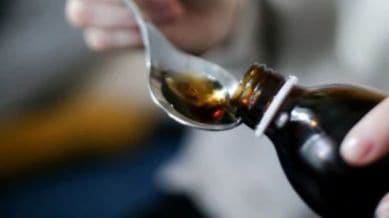Click here to join Express Pune WhatsApp channel and get a curated list of our stories
No Coldrif in Maharashtra: FDA on alert, monitoring of two other cough syrups
Following an official communication from the FDA in Madhya Pradesh, the Gujarat FDA also issued a public alert.

In wake of 14 child deaths in Madhya Pradesh, allegedly linked to contaminated cough syrup, Maharashtra’s Food and Drug Administration (FDA) said on Tuesday that Coldrif cough syrup has not been supplied to the state. Authorities have also issued directives to prohibit the sale of the affected batches of two other cough syrups, in case the stock is found locally.
Ghane said that there was no supply of Coldrif cough syrup in the state, which was found to contain the toxic Diethylene Glycol from the Tamil Nadu based company. “We have also sent our field inspectors to check if the batches of two other cough syrup formulations declared substandard by the government, are in supply in the state. These are from a firm in Gujarat and strict instructions have been issued to prohibit the stock if available in Maharashtra,” he added
DEG is a harmful chemical that can lead to severe poisoning, including kidney failure, neurological damage, and potentially fatal outcomes, especially in children. The FDA has strictly prohibited the sale and distribution of the affected batches.
Authorities in the Pune division are also taking coordinated action to address the issue. “We will also be monitoring actively and as a precautionary measure collect samples of other cough syrups from chemists and government hospitals,” Girish Hukare, Joint Commissioner of the FDA’s Pune Division, which includes Pune, Satara, Sangli, Kolhapur, and Solapur told The Indian Express. Anil Belkar, Secretary of Pune District Chemists’ Association said that they have urged chemists to return the batches if any to the stockists.
‘Symptoms hard to recognise’
Dr I S Gilada, consultant in infectious diseases and Secretary General People’s Health Organisation- India explained that most laypersons are unable to recognise the early signs and symptoms in children that could indicate adverse effects from contaminated cough syrups.
Diethylene Glycol (DEG) is a highly toxic substance that acts quickly—causing damage to the kidneys within just a few hours to a day. “By the time parents realize their child is unwell, kidney function may already be severely compromised, leading to a complete absence of urine output,” Dr Gilada said.
The expert who was a resident medical officer at J J Hospital, Mumbai recalled the tragic case when contaminated syrup had led to 14 deaths in Mumbai.
IMA calls for strict action but deems arrest unfair
At the All India Organisation of Chemists and Druggists, President J S Shinde said that strict action must be taken against the offenders. ‘Time and again we have urged the government to take stern measures. At our end we have instructed our chemists and druggists to purchase from authorised firms and not get attracted by deep discounts. At Indian Medical Association (IMA) authorities have deputed the Presidents of its Madhya Pradesh and Rajasthan branches to investigate the incident involving contaminated cough syrups.
Dr Dilip Bhanushali, National President, IMA also said that they were united in the protest against the ‘unfair and unconstitutional arrest’ of a doctor who prescribed the cough syrup. “The cough syrup tragedy in Madhya Pradesh and the subsequent arrest of the doctor who prescribed the same is a classical example of legal illiteracy of the officials and the police,” IMA later said in an official statement. In Pune too authorities at IMA Dr Sunil Ingale and Dr Sanjay Patil said that they had demanded immediate action on the actual culprits and adequate compensation for the affected families and the doctor who is a victim of defamation.
Dr Bhanushali also said that pharmaceutical-grade glycerin and propylene glycol required for manufacturing cough syrups are expensive. Toxic substances such as industrial-grade DEG and ethylene glycol (EG) are cheaper and visually indistinguishable. “If quality control fails at the level of both the manufacturer and the regulator, cough syrups produced by a few companies may end up containing toxic substances capable of causing kidney failure and death in young children. This has happened several times in the past in multiple countries among children after apparently consuming contaminated cough syrup. The prescribing doctor has no way of knowing whether a medicine is contaminated until adverse outcomes are reported among patients who have taken it. Regulation must therefore be made foolproof to prevent such tragedies,” the IMA statement added.
Click here to join Express Pune WhatsApp channel and get a curated list of our stories